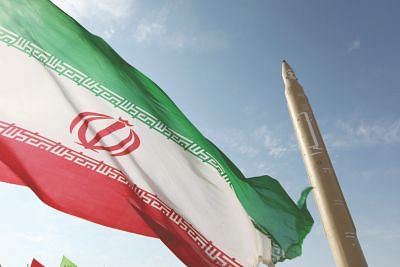Iran's nuclear puzzle game: Rhetoric vs. pragmatism

Photo: AFP
Iran's nuclear puzzle game is at a crossroad. Despite the exchange of threats and counter-threats of annihilation by the Iranian and Israeli politicians, for the first time, the stakeholders of this issue have sought for dialogues and multilateral-based solutions.
The main actors of this game are Iran, Israel and the United States. In recent times, two of the most important elections were settled in the United States and Israel, and the upcoming Iran's presidential election will be held on June; this year. The leaders of these countries are now dealing with this issue in ways that are more rational.
"Rational" decision-making suggests that there can be two extreme options in dealing with Iran's nuclear programme, as we have seen in the past.
Firstly, frequent threats of destroying Iran's nuclear installations by swift Israelis air strikes, and secondly, by imposing tough economic and military sanctions to desist Iranians from nuclear ambitions.
The ultimate objective is to roll back the Iranian nuclear programme. However, these policies had not been successful, as Iran has already achieved technical knowledge and capabilities to develop fissile materials.
Iran has also demonstrated its military strength against the threat of closing down the Strait of Hormuz, which is critical in getting access to the bay of gulf and oil resources of Middle Eastern countries. Nearly 20 percent of the world oil flows through the Strait of Hormuz.
This demonstration has resulted with a sharp increase in oil price; over US$100 per barrel crude oil in western nations. Moreover, many believe that an Israeli air strike may provide Iran with an excuse for accelerating its nuclear programme. Therefore, Israeli policy-makers have been dealing with the "strike or non-strike" dilemma for years.
As observed, the issue of how to deal with Iran's progressing nuclear programme had been the top agenda of the Israeli's election campaign last year. The air attack of Israeli Defence Force-IDF had become inevitable at the public sphere during the election campaign. Israeli politicians considered a nuclear-armed Iran as an existential threat as Iranian leader's constantly called for destruction of Israel and their development of missile capabilities to strike deep inside the Jewish state.
However, Israeli Prime Minister Netanyahu often talks about possible attacks on Iran's nuclear facilities but President Shimon Peres vowed not to act alone on Iran's nuclear issue. In his speech at the newly elected Parliament on February 3, 2013, President Peres talked about forming wide coalition, which is combined with diplomatic pressure and economic sanctions against Iran.
This changing tone has clearly confirmed that the re-elected President Obama and his new Secretary of State John Kerry initiated pragmatic approach to deal with Iran' nuclear programme. The only superpower has eschewed the unilateralism and sought after multilateral negotiations. This brought back a sense of confidence among the Iranian leaders on the international norms and principles.
The year-long policy of denying Iran's nuclear capacity by the Israelis and other world powers has come to an end. Iranian leaders are now optimistic about their legitimate rights to develop nuclear technology for peaceful purposes. In response to the US and Israeli leaders' renewed policy, Tehran announced new talks on nuclear programmes.
The six party (Britain, China, France, Russia, the United States and Germany, known as P5+1) will hold talks with Iran in Kazakhstan on February 25, 2013. Many experts are skeptics about its outcome.
The negotiators should take two important issues into consideration. First, how to deal with Iran's legitimate demand of developing nuclear power for generating electricity. Iran is a signatory member of Non-Proliferation Treaty (NPT) and also the Member of IAEA. The Iranian negotiators have been extensively demanded their rights to a full cycle under the nuclear non-proliferation treaty. But, the six-party have refused that demand, as there is a suspicion that Iran may go over 20 percent of Uranium enrichments; which is the first step to making an atomic bomb.
Secondly, they should plan on how to develop confidence among Iranian leaders in the outcome of the six-party talks. Iranian leaders have been considering six-party talks as a Western ploy to curb down Revolutionary Islamic regime in Iran.
Recently, Abdollah Haj-Sadeghi, a representative of Supreme Leader Ayatollah Ali Khamenei to Iran's elite Islamic Revolutionary Guard Corps (IRGC), indicted Western countries to be arrogant and declared that a revolution with a religious nature cannot reconcile itself with arrogance. They see that the talks as just "buying time" for the Israeli politicians to prepare attacks on the Iranian nuclear programme.
Given all these constraints and issues, it is certain that the puzzle of Iran's nuclear game has to be resolved in more coherent and multilateral ways. At this stage, it is difficult for the actors of this nuclear puzzle game to find out any solutions other than through diplomacy.
A three-pronged approach should be taken to break the Iranian nuclear standoff. Initiate and continue six party talks, pledge Israeli and Iranian leaders to face the realities and not to exchange threats to each other's existence, and finally develop confidence among the Iranian leaders through withdrawal of economic sanctions and avoidance of military power projections in the Middle East, so that Iran adheres to the international norms and principles.
Since both sides have strong bargaining chips, the world may see an outcome in the future.
The writer is Lecturer, Department of International Relations, University of Dhaka.
E-mail: [email protected]

 For all latest news, follow The Daily Star's Google News channel.
For all latest news, follow The Daily Star's Google News channel. 



Comments